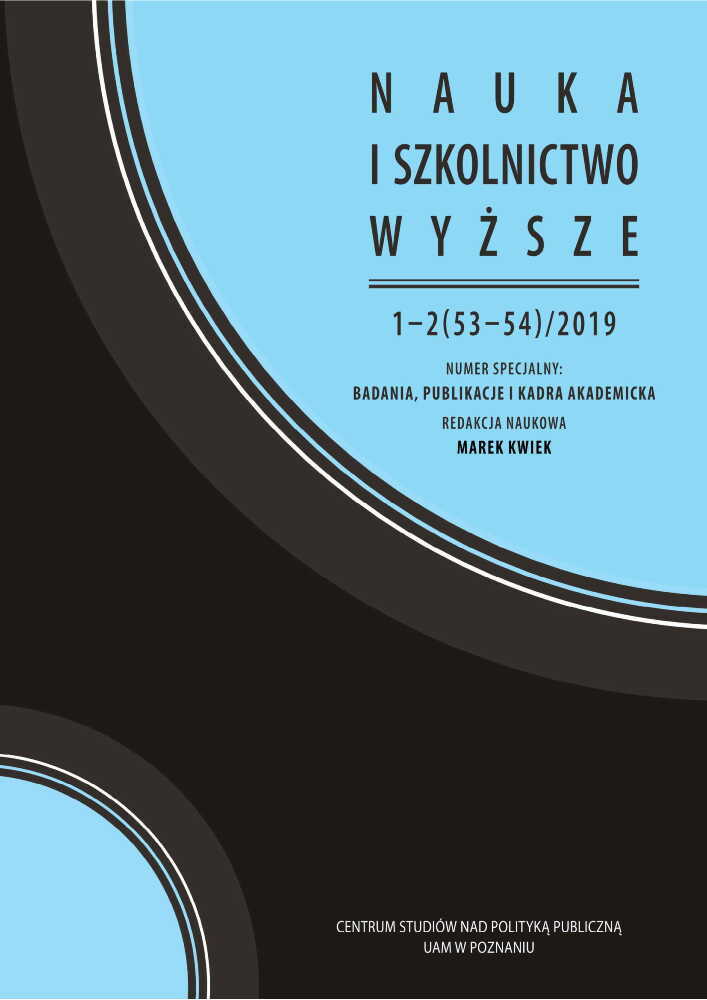Abstract
Agency theory is a concept used primarily to describe corporate governance phenomena. This theoretical platform is also used to describe the processes associated with the functioning of the higher education system. Contractual relationships in this sector make it possible to identify institutions that may act as principal or agent, depending on the perspective of the research perspective. Relations between the state / government (principal) and public universities (agents) are the most commonly studied subjects. The aim of the article is to present proposals for the reform of the higher education system in Poland, using agency theory as the research perspective. This was the starting point first to identify the most important dysfunctionalities of the current system as a manifestation of the agency problem. Secondly, the proposed new standards for the functioning of the system were confronted with theoretical mechanisms which are used to reduce conflict of interest: outcome-based contract and behavior-based contract. The considerations presented in the article point to the ability to identify effective institutional structures in the higher education system, the essence of which is to solve the agency problem. The foundation of the recommendations contained in all reform proposals is the desire to increase the institutional autonomy of public universities, in relation to state authorities, but also in relation to internal academic units. It is the strong leadership of the university, motivated by the principle of using personalized tools, primarily financial, with effective control over the processes within the university, is a fundament for achieving the goals of the Polish higher education sector.
Funding
Wydanie tego tomu nie byłoby możliwe bez wsparcia otrzymanego w ramach projektu MNISW Dialog (0022/DLG/2019/10), za co redaktor wyraża podziękowanie.
References
Agasisti, T. i Catalano, G. (2006). Governance models of university systems – towards quasi-markets? Tendencies and perspectives: A European comparison. Journal of Higher Education Policy and Management 283: 245–262.
Austin, I. i Jones, G.A. (2016). Governance of Higher Education. Global Perspectives, Theories, and Practices. New York: Routledge.
Bosse, D.A., Phillips, R.A. i Harrison, J.S. (2009). Stakeholders, reciprocity, and firm performance. Strategic Management Journal 30: 447–456.
Clark, B.R. (1983). The Higher Education System. Academic Organization in Cross-National Perspective. Berkeley: University of California Press.
Clark, B.R. (1984). The organizational conception. W: B.R. Clark (red.), Perspectives on higher education. Eight disciplinary and comparative views (106–131). Berkeley: University of California Press.
Davis, J.H., Schrooman, F.D. i Donaldson, L. (1997). Toward a Stewardship Theory of Management. Academy of Management Journal 221: 20–47.
Dakowska, D. (2014). Between competition imperative and Europeanisation: the caseof Higher Education reform in Poland. Higher Education 69: 129–141.
Eisenhardt, K.M. (1989). Agency Theory: An Assessment and Review. Academy of Management Review 141: 57–74.
Gomez-Mejia, L.R. i Balkin, D.B. (1992). Determinants of faculty pay: An agency theory perspective. Academy of Management Journal 355: 921–955.
Gornitzka, A., Stensaker, B., Smeby, J-C. i de Boer, H. (2004). Contract arrangements in the Nordic countries: Solving the efficiency/effectiveness dilemma?. Higher Education in Europe 291: 87–101.
Izdebski, H. (red.). (2017). Założenia do projektu Ustawy „Ustawa 2.0. Założenia systemu szkolnictwa wyższego”. Uniwersytet SWPS, Warszawa.
Jensen, M.C. i Meckling, W.H. (1976). Theory of the firm: Managerial behavior, agency costs and ownership structure” Journal of Financial Economics 34: 305–360.
Johnes, J. (2016). Performance indicators and rankings in higher education” in Valuing Higher Education: An appreciation of the work of Gareth Williams and the Centrefor Higher Education Studies. Institute of Education, University College London.
Jongbloed, B., Enders, J. i Salerno, C. (2008). Higher education and its communities: Inter-connections, interdependencies and a research agenda. Higher Education 56: 303–324.
Kagaari, J.R.K, Munene, J.C. i Ntayi, J.M. (2013). Agency relations and managed performancein public universities in Uganda. SA Journal of Industrial Psychology/SA Tydskrifvir Bedryfsielkunde, 391, Art. #916, 10 pages. http://dx.doi.org/10.4102/sajip.v39i1.916.
Kivisto, J.A. (2007). Agency theory as a framework for the government-university relationship. Dysertacja akademicka, Tampere: Higher Education Group/Tampere University Press.
Kivisto, J.A. (2008). An assessment of agency theory as a framework for the government-university relationship. Journal of Higher Education Policy and Management 304: 339–350.
Kluvers, R. i Tippet, J. (2011). An exploration of stewardship theory in a Not-for-Profitorganization. Accounting Forum 35: 275–284.
Kwiek, M. (2014). Structural changes in the Polish higher education system (1990–2010): a synthetic view. European Journal of Higher Education 4: 266–280.
K
wiek, M., Antonowicz, D., Brdulak, J, Hulicka, M., Jędrzejewski, T., Kowalski, R., Kulczycki, E., Szadkowski, K., Szot, A., Wolszczak-Derlacz, J. (2016). Projekt założeń do ustawy Prawo o szkolnictwie wyższym. Poznań: Uniwersytet im. Adama Mickiewicza.
Lane, J.E. (2007). The Spider Web of Oversight: An Analysis of External Oversight of Higher Education. The Journal of Higher Education 786: 615–644.
Liefner, I. (2003). Funding, resource allocation, and performance in higher education systems. Higher Education 46: 469–489.
Lubatkin, M., Lane, P.J., Collin, S. i Very, P. (2007). An embeddedness framing of governance and opportunism: towards a cross-nationally accommodating theory of agency. Journal of Organizational Behavior 28: 43–58.
Macias, A. (2012). A Case Study Using Principal-Agent Theory to Explore How a Public, Four Year University Interacts with a System Office. Rozprawa doktorska, University of Nevada.
McLendon, M.K. (2003). The politics of higher education: Toward an expanded research agenda. Educational Policy 171: 165–191.
Muth, M.M. i Donaldson, L. (1998). Stewardship Theory and Board Structure: a Contingency Approach. Corporate Governance 61: 5–28.
Pagano, M. i Volpin, P.F. (2005). The Political Economy of Corporate Governance. American Economic Review 954: 1005–1030.
Radwan, A. (red.). (2017). Plus ratio quam vis consuetudinis. Reforma nauki i akademii w Ustawie 2.0, Kraków.
Suchman, M.C. (1995). Managing Legitimacy: Strategic and Institutional Approaches. Academy of Management Journal 203: 571–610.
Thieme, J.K. (2009). Szkolnictwo wyższe. Wyzwania XXI wieku. Polska, Europa, USA Warszawa: Difin.
Toma, E.F. (1986). State university boards of trustees: A principal-agent perspective. Public Choice 49: 155–163.
Toma, E.F. (1990). Boards of trustees, agency problems, and university output. Public Choice 67: 1–10.
Urbanek, P. (2014). Problem agencji w warunkach zdecentralizowanego modelu zarządzania uczelnią publiczną. Prace Naukowe Uniwersytetu Ekonomicznego we Wrocławiu, tom 343: 350–359.
Wiseman, R.M., Cuevas-Rodrigues, G. i Gomez-Mejia, L.R. (2012). Toward a Social Theory of Agency. Journal of Management Studies 491: 202–222.
